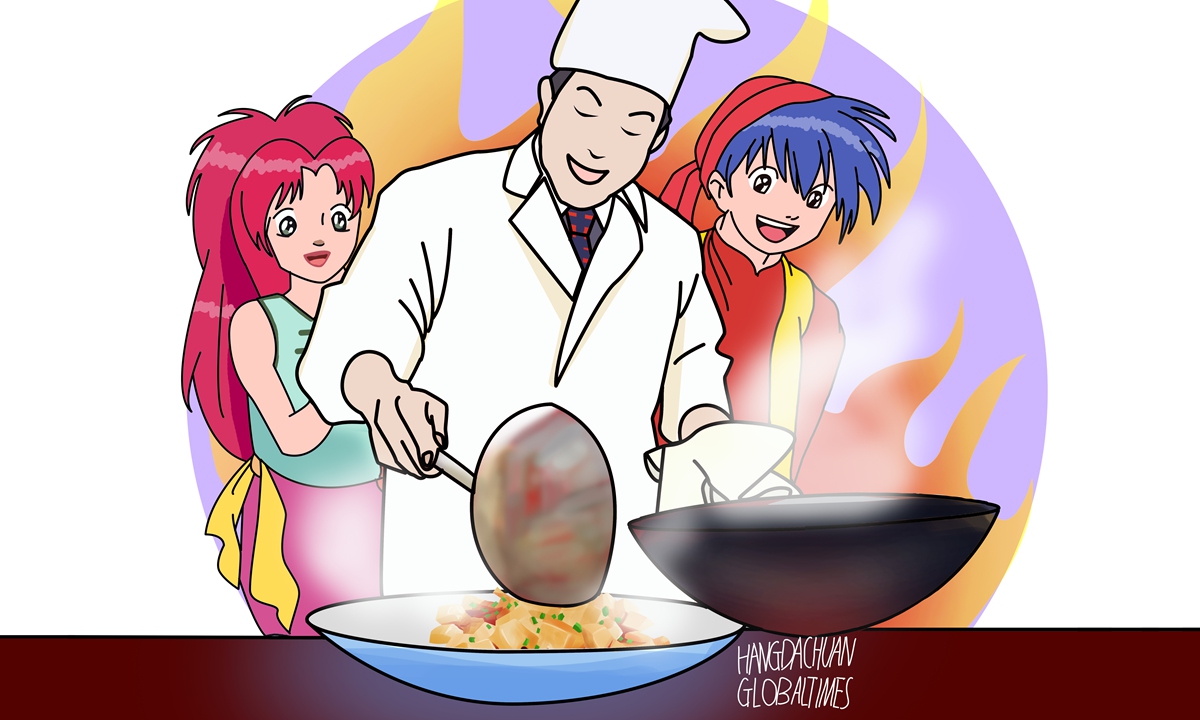ARTS / FILM
Japan’s shared taste, memory for ‘cooking master boy’ from China

Illustration: Hang Dachuan/Global Times
In Japan, anyone who loves mapo tofu, a dish from Southwest China's Sichuan Province, knows chef Chen Jianyi, a man who devoted his life to cooking and adapting this hot and spicy Chinese dish for Japanese customers. Chen's career and life even inspired a Japanese manga artist to create Cooking Master Boy, a household manga and anime which became a common childhood memory among Japanese born in the 1980s and 1990s.
Sadly, chef Chen passed away recently, and the news of his death dominated media headlines in Japan. Etsushi Ogawa, the author of the manga, also wrote an article to mourn Chen.
This shows just how much the Japanese love the dish he cooked and Chinese cuisine in general, and how food culture has played an important role in promoting communication and cultural exchanges.
It is said that the three things from Sichuan Province that have influenced Japan are the classic novel Romance of the Three Kingdoms, pandas and Sichuan cuisine.
Chen was a household name in Japan. His father Chen Jianming was also a chef and was even given the name as the "God of Sichuan cuisine" in Japan. The father and son's dedication to promoting the food of their home province provided the inspiration for the creation of the anime.
Chen Jianmin was born into a farming family in 1919 in Sichuan. When he was 10, he began to learn how to cook from his grandfather at a restaurant. He later worked in cities including Chongqing, Chengdu and Hong Kong, gradually building up his fame.
In 1952, Chen Jianmin went to Japan after ending his business in Hong Kong. He managed to open the first Sichuan cuisine restaurant in Tokyo six years after his arrival thanks to his excellent cooking skills. To better cater to the tastes of Japanese people, he used some local spices to adapt traditional Sichuan dishes.
With the help of his wife, Chen Jianmin set up an "Institute of Chinese Cuisine," which has trained 15,000 chefs making a great contribution to the spread of Chinese food in Japan. In 1987, he was awarded the title of "modern master craftsman" in food culture, becoming the first Chinese-Japanese to win such an honor.
His son Chen Jianyi, born in 1956, grew up with "the kitchen as his playground." After graduating from college with a degree in English literature, instead of working in his own discipline, he became his father's apprentice to learn to cook Sichuan cuisine.
After his father passed away in 1990, Chen took over the Sichuan restaurant at the age of 34. However, he was never a rigid follower. He improved their family's signature dish even further to give it a "spicy and slightly sweet taste." In a cooking competition in 1993, he broke a record and claimed the title of "First Chef of Chinese Food" in Japan.
By virtue of this reputation, his deep love for his father and his extraordinary management skills, he opened 16 Sichuan restaurants in Japan and wrote books, both of which helped enhance Chinese food culture.
Influenced by the "Sichuan cuisine fervor," a Japanese fan set up the nongovernmental organization "Hot and Spicy Federation" and launched the first Sichuan Food Festival in Tokyo in 2017. At its peak, the festival once drew in 100,000 participants. From the very beginning, the two Chens' mapo tofu became a hit that no other dish could match.
"My job is to offer delicious Chinese food, and to disseminate Chinese culture," Chen Jianyi once said.
Without his dedication to learning, adapting, innovating and promoting Sichuan dishes, Chinese food would not fascinate the Japanese as it does.
Chen Jianyi's spirit also moved his son Chen Jiantaro, who chose to take his father's career path.
Chinese food culture is an important part of Chinese culture. The Sichuan cuisine Chen's family promoted has served as a bridge to connect the people of China and Japan, helping enhance the cultural exchanges between the two peoples.


